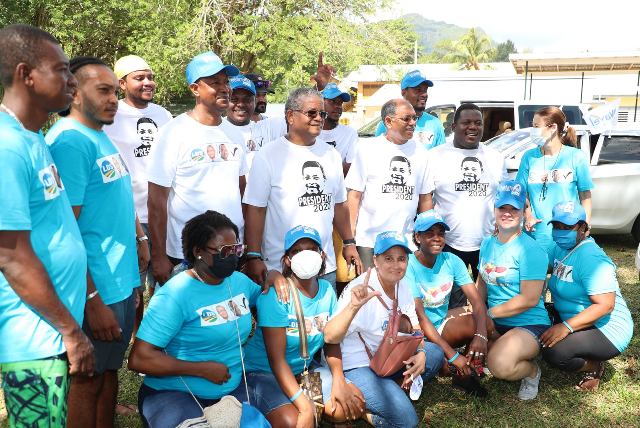 Wavel Ramkalawan in September 2020. [Wavel Ramkalawan's Facebook page]
Wavel Ramkalawan in September 2020. [Wavel Ramkalawan's Facebook page]
A new chapter began in Seychelles as an opposition candidate won the presidency for the first time since independence in 1976. It had taken six attempts for Wavel Ramkalawan, an Anglican priest. Leader of the liberal Linyon Demokratik Seselwa (Seychelles Democratic Alliance), Ramkalawan secured 54.9% of votes to 43.5% for the incumbent, Danny Faure, of the left-wing United Seychelles Party (USP). The third candidate, Alain St Ange, of the One Seychelles Party, had 1.6%, the Seychelles Electoral Commission reported. Turnout was an impressive 88.5%.
In stark contrast to the United States, where the losing president, Donald Trump, was refusing to concede defeat, Faure bowed out gracefully and wished his successor luck. ‘We have heard the voices of the people of Seychelles,’ he said. ‘I congratulate Ramkalawan.’ His rival responded in kind, declaring: ‘Mr Faure and I are good friends. And an election does not mean the end of one’s contribution to one’s motherland. In this election, there were no losers, there were no winners.’
The Seychellois had lived under USP rule almost since the Indian Ocean island gained independence from Britain in 1976. A year later, France-Albert René, first prime minister and founder of the USP’s forerunner, the Seychelles People’s United Party (later the Seychelles People’s Progressive Front) seized power in a coup while the first president, James Mancham, was abroad. René made the USP the sole party from 1979 to 1993, but it remained in power for another 13 years and only became the parliamentary opposition in 2016.
After a campaign played out largely over social media as coronavirus prevented rallies, Ramkalawan, 58, also led his opposition alliance to victory in the legislative election, taking 25 seats, or more than a two-thirds majority, to the USP’s 10. ‘After 43 years we have regained democracy,’ he declared. Faure’s defeat surprised some observers. Foreign Brief had predicted: ‘It is likely that Faure will retain his presidency … Ramkalawan and St Ange will likely split the opposition vote, allowing USP to maintain control of government.’ Ramkalawan, who lost in 2015 by just 193 votes, had vowed this would be his last run at the presidency. Calling for civility with ethnic and social differences put aside, he pledged to make the new government more inclusive and called for a ‘national consultation’. Two issues flagged up before the election were young people’s disengagement and low levels of voting, and the dearth of women in parliament – from 44% in 2011 to 21% by 2019, below the world average.
The Seychelles has been hit hard by coronavirus. According to the World Bank, it had a gross domestic product of nearly $17bn last year, and Africa’s highest GDP per capita; the economy grew by an average of 4.2% a year from 2009-19. But it is heavily dependent on tourism, with about 350,000 visitors a year accounting for 65% of GDP. Although the Seychelles had only recorded 158 cases of Covid-19, with no deaths, by 12 November, according to Johns Hopkins University, the economy was devastated as the pandemic shut down the travel industry and borders closed. Unemployment rose from 4.8% to 6.3% and, the national statistics agency noted, while average income is among Africa’s highest, about four in 10 citizens live in poverty because of the high cost of living. Approving emergency financial aid to help the Seychelles’ balance of payments, the International Monetary Fund said: ’Seychelles’ hard-won economic gains since the 2008 [global financial] crisis, supported by successive Fund arrangements, are being eroded by the severe impact of the Covid-19 pandemic.’ Somewhat surprisingly, the Seychelles also has the world’s worst heroin problem: 6,000 of its 94,000 people – nearly 10% of the working population – are addicted. The country is well-placed to tackle the crisis, however, eschewing a ‘war on drugs’ stance in favour of treating addiction as a chronic disease and not criminalising users.
Ramkalawan made a pointed homage to Gérard Hoarau, an opponent of René who was exiled, spied on and eventually shot dead with a submachine gun on his doorstep in London in 1985. Though far from the only opposition figure to die or disappear during the one-party era, he was the most high-profile opposition figure to be murdered. ‘There is no doubt that those revelations harmed the chances of Mr Faure and his United Seychelles party in these elections,’ the BBC said. Despite the obstacles he faces, Ramkalawan is a more seasoned politician than his religious background and exclusion from office might suggest. Writing for Australia’s Lowy Institute, Ashton Robinson described Ramkalawan as ‘a prodigious organiser and talented schemer. He has a marked ability for making quarrelsome rivals cooperate. And his parliamentary skills are of a high order.’ The 2018 Truth, Reconciliation and National Unity Commission, which investigated the ‘murders, exilings, expropriations and egoism’ of the René regime, was his ‘masterpiece’, said Robinson, who noted how Ramkalawan had won the support of the old white liberal elite and the African creole majority, despite being of Indian heritage and a Protestant cleric in a Catholic country.
Robinson sees tensions ahead over the Seychelles’ emergence as an emerging offshore financial centre: the 140,000 company registrations and burgeoning banking sector could put it on course for confrontation with western efforts against money-laundering and tax evasion. The archipelago’s strategic position in the Indian Ocean is another hot topic after Ramkalawan led opposition to plans for India to build a naval base on an outlying island. Beijing is likely to vie with Delhi for influence over the new government now. Ramkalawan, the politician-priest, faces high expectations and significant headwinds in his new job.



